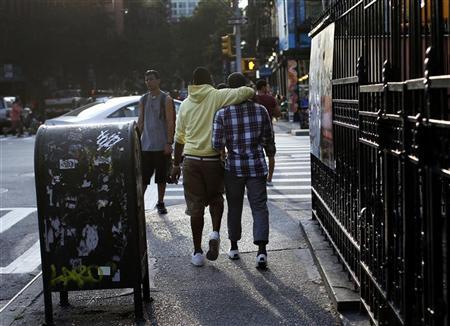
Gabon’s gay community has welcomed the decriminalisation of homosexuality adopted this week, a year after an initial ban on same-sex relations sparked weeks of debate and sharply divided the central African country.
The criminalisation of homosexuality went almost unnoticed in this country of less than two million inhabitants when it was adopted last year.
But the amendment to the legislation adopted by Gabon’s parliament late Monday has underscored divisions with praise from activists contrasting with anger from opponents in the local press, on social media and in the streets.
“It’s good news. We’re finally going to be able to breathe a sigh of relief,” said Parfait Magnaga, the head of Sante + Pro Humanitus, one of the only associations defending the rights of sexual minorities in Gabon.
The amendment removes text, added by the Senate in July 2019, which made same-sex sexual relations a criminal offence, punishable by up to six months in prison and a fine of five million CFA francs (7,600 euros).
The change will formally become law once the president — whose government pushed for the amendment — ratifies it.
Although the law was never applied, “in the past year, we have been more vulnerable to violence because we no longer had the law on our side,” Magnaga, a psycho-sexologist by profession, told AFP.
In normal times, “it’s already difficult for a homosexual here to go and file a complaint when he’s verbally or physically attacked,” he added.
“Parliament’s vote is a small victory for us, but it is not a question of gloating now. We prefer to remain discreet,” he said.
Magnaga said the gay community above all wants Gabon to turn the page on this “trying” political time.
Homophobic comments
For three weeks, the issue of decriminalising homosexuality caused a stir and drew homophobic comments from all corners of Gabon.
Some press articles went so far as to equate homosexuality with paedophilia and bestiality.
Leaders of the Catholic Church and the opposition have condemned homosexuality in public forums, often in violent terms, while messages inciting hate against homosexuals have been rampant on social media.
“In the taxi, in the neighbourhood, on television, at home, homophobic remarks were everywhere,” said Magnaga.
The psychologist recorded a video, which he said was shot this past week in the capital’s biggest market, showing a young man accused of being homosexual being chased by a group, insulted and narrowly escaping an attack thanks to the intervention of another man.
‘Foreign to our morals’
Many opponents of decriminalisation claim that the vote in parliament is far from a true reflection of the opinion of most Gabonese people.
Decriminalisation “does not enjoy a great deal of support”, political opponent Paul-Marie Gondjout wrote in an open letter to the government, deploring “a power that clearly chooses, and against the interests of its people, to serve lobbies and morals that are foreign to our habits and customs”.
Jean-Patrick Iba-Ba, the archbishop of Libreville, accused “certain international organisations” of “conditioning their aid on the acceptance of behaviour which is foreign to our morals”.
Homosexuality is widely criminalised in sub-Saharan Africa, with more than half of its countries banning or repressing same-sex relations — in a few places, with the threat of the death penalty.
However, Gabon had never banned homosexuality before last year, and its legislation had not even mentioned it.
The UN Resident Coordinator in Gabon, Stephen Jackson, welcomed the vote on Monday, saying it was in line with Gabon’s constitution which “recognises every person’s right to the ‘free development of their personality'”.
The UN representative hailed Gabon as a “proud, independent and sovereign nation”.
– AFP

0 Comments